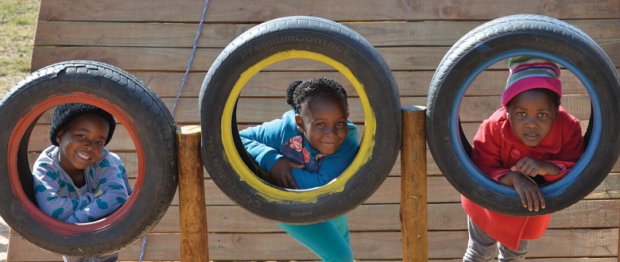Inclusive education through capacity development
Discussion details
Despite the high enrolment rates in South Africa’s primary education system, educational achievements remain low in the country. Students’ success in learning is largely determined by their economic background and the capacity of their teachers to make education inclusive.
South Africa witnesses a significant learning gap between the poorest 60 percent of learners and the 20 wealthiest percent, which widens throughout their school career. Especially children who experience barriers to learning – be it a disability or a challenge linked to their race, gender, class or origin – are most at risk of being left behind by an environment that is not aware of their challenges nor capable of adjusting the teaching strategies to include them. To mitigate the disparities between its primary school learners, the country adopted a promising policy to screen, identify, assess and support learners, who face systemic, extrinsic or intrinsic barriers to learning.
However, the success of these inclusive education guidelines largely depends on the teacher’s capacity to put them into practice. Unfortunately, especially in economically challenging circumstances, primary teachers are not adequately prepared to provide quality differentiated education and respond to the diverse needs of young learners in an adequate and timely manner.
| The critical role of teachers as agents for inclusion was also highlighted during VVOB’s participation at the European Development Days in 2019: Following an invitation from UNESCO’s Teacher Task Force, VVOB introduced research and lessons learnt on teacher professional development for equitable and inclusive education. |
The EU-co-funded VVOB project Teaching and learning for inclusive education (TL4IE) improved the knowledge and skills of Foundation and Intermediate Phase teachers to identify and address barriers to learning experienced by young learners in primary schools. The project was implemented from 2016 to 2019 in partnership with Inclusive Education South Africa (IESA), the National Department of Basic Education (DBE), the National Department of Higher Education and Training (DHET) and three South African universities that offer education in teaching, namely the University of the Witwatersrand (Wits), North-West University (NWU) and the University of the Free State (UFS).

To put this goal into practice, VVOB and its partners developed a comprehensive approach to teacher professional development, which focussed on three phases of the teacher’s career: initial teacher education programmes, newly qualified teachers and in-service teachers:
- Improving the preparation of student teachers by ensuring that initial teacher education programmes at NWU, UFS, Wits, the Central University of Technology, and the University of Fort Hare address inclusive education in different subjects and during student teachers’ teaching practice.
- Ensuring that newly qualified teachers in the Free State, Northern Cape, and North West Provinces are off to a good start by providing them with an induction programme on inclusive education.
- Providing in-service teachers with quality opportunities for continuous professional development, most notably through well-functioning professional learning communities that treat inclusive education as a core topic.
To share valuable lessons learnt towards the end of the project, VVOB, together with its partners organised a symposium on Teachers Education for Inclusive Teaching to present achievements, challenges and results on how inclusive education was understood by student teachers. Moreover, VVOB and IESA developed FundaOER, a South African open educational resources platform that has been designed to offer a wide collection of free and open resources to providers of both pre-service and in-service teachers. The materials can be used in inclusive education modules, as well as in the pedagogical and subject-matter modules of initial teacher education and in the professional learning communities.
VVOB’s Bambanani video series, which supports teachers to embrace diversity and strengthen inclusive teaching practices, is also freely available on YouTube. Each of the 15 videos transports you to a South African classroom in action and shows how a teacher differentiates their teaching methodologies, content and assessment strategies in numeracy and literacy classes. As such, the series provides teachers and other educators with relevant and clear inspiration on how to reach every learner and stimulate participation by all. The Bambanani video series was acknowledged with the Belgian Digital 4 Development Prize in 2020.
Log in with your EU Login account to post or comment on the platform.